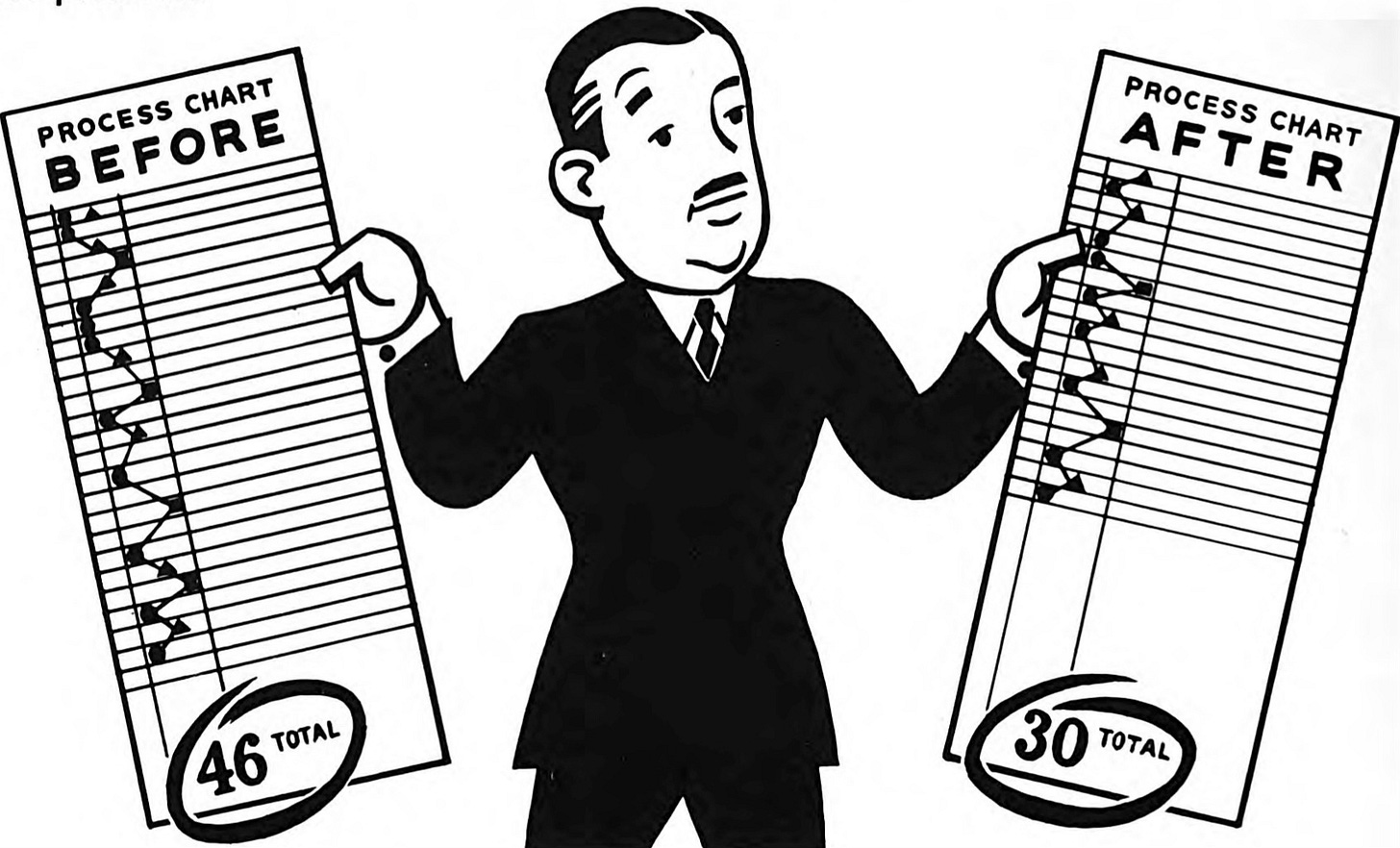Forking Work Simplification & More
Let's Bring Back Truman's and Eisenhower's Front Line Process Improvement Program
Happy April Fool’s, but frankly we are all (well almost all) business today with a neat little update.
Kevin Hawickhorst’s article talked about Eisenhower-era process improvement tools that transformed federal efficiency during the 1940s-1960s, when government trust reached 80% and major national projects succeeded. You know what? Why keep such a gem hidden away in old dusty books and digital pdf scans? We should create a documentation site with the intent of fully recreating, updating, and creating alternative versions of the Work Simplification program and the artifacts (training materials, art, etc)—not just for governments but for civic organizations, political campaigns, and businesses. The idea is to make it easier for today's organizations (or at least the common political actor local government employee) identify unnecessary procedural steps and eliminate bottlenecks that waste resources, maybe even spot loopholes and poison pills in bills and plans to spot for.
Right now we converted the associated manuals into a docs site called Standards, with our end of April plans is recreate the other materials like Process Chart forms and the such
Why Does This Matter?
Process improvement isn't intuitive for most people. As stated in earlier articles, even big boy corporations with dedicated resources often struggle to implement it effectively (don’t believe me, ask McKinsey who is less trustworthy than I am but for some reason, you trust these guys). And while think tanks occasionally tackle implementation issues, they're typically far removed from the ground-level reality where policies succeed or fail.
We need to make process improvement accessible to ordinary people in local groups who have the most direct experience with broken processes. They don't need MBA jargon or complex methodologies—just practical tools to document what's happening in their communities. Practical tools like what the Work Simplification Program has to offer.
A hypothetical example is a local YIMBY volunteer who's helped ten homeowners navigate ADU permits and has invaluable knowledge that no policy expert in Sacramento possesses (which is a good idea in its own right, instead of an accounting student helping people file taxes, law or real estate students helping people navigate ADU permits with the understanding they are not real estate lawyers). Adjusting Work Simplification’s Process Charting (making a list of all the steps one by one and making them like a more verbose flowchart), so that volunteer with basic process mapping skills increases the chances that the volunteer might spot something everyone else overlooks!
Unlike corporate “process improvement” which focuses on short-term cost-cutting or (in very rare cases since Deming’s death) efficiency, the WW2-era political process improvement focuses on effectiveness—making the government deliver what laws promise just like what happened during the 40s and 50s. This distinction matters because it centers on citizen experience rather than administrative convenience.
Even something as esoteric as increasing fertility rates, there is a growing mountain of research and case studies showcasing the value of better implementation or even better local government can provide, let’s say “booming” results (*sounds of crickets chirping* yes I want to make that joke again).
Recreating Work Simplification will help us deal with failures aren't about policy intent but process implementation.
On That Note
The consolidated training manual is called “Work Simplification as Exemplified by the Work Simplification Program of the U. S. Bureau of the Budget.” It is online on Hathitrust. To read it, you have to be located in the US. To download it, you have to have an institutional subscription. Or, you can reach out to me and I be glad to give you a digital pdf.




This coincides very nicely with the recent interview of Ezra Klein on Jon Stewart's podcast "The Weekly Show" - titled "Why We Can't Have Nice Things". I'm linking to 45m20s mark, a section titled "There are more efficient ways to pass laws": https://www.youtube.com/watch?v=NcZxaFfxloo&t=4307s - here's some key points:
Complex Bureaucratic Processes: Ezra Klein discusses how modern liberal governance often involves overly complicated, multi-step bureaucratic processes that delay the implementation of laws. For example, the rural broadband initiative passed in 2021 still hadn't been fully implemented by 2024 due to a 14-stage process involving multiple approvals, public comment periods, and challenges at both state and federal levels.
"Everything Bagel Liberalism": Klein critiques what he calls "everything bagel liberalism," where well-intentioned policies are burdened with excessive requirements that aim to solve multiple issues simultaneously (e.g., equity standards, environmental goals). This makes projects more expensive and harder to execute, often excluding smaller entities from participation.
Comparison to Historical Efficiency: Klein contrasts this inefficiency with past government successes like the Works Progress Administration (WPA) during the New Deal or the rollout of Medicare in the 1960s, which achieved results much faster. He emphasizes that these delays are not inevitable but are a result of choices made in modern governance.
Impact on Public Trust: The slow pace of implementation undermines public trust in government. Klein argues that when people cannot see tangible benefits within a reasonable timeframe, it erodes faith in liberal democracy and fuels skepticism about government effectiveness.
Need for Streamlined Governance: Klein advocates for empowering officials and simplifying processes to make government more effective. He points out that Democrats often design their own policies in ways that hinder their implementation, even without Republican interference.
Examples of Success and Failure: While highlighting failures like rural broadband, Klein also acknowledges successful initiatives such as the Inflation Reduction Act's impact on green energy. He stresses that government can work effectively when processes are designed efficiently.